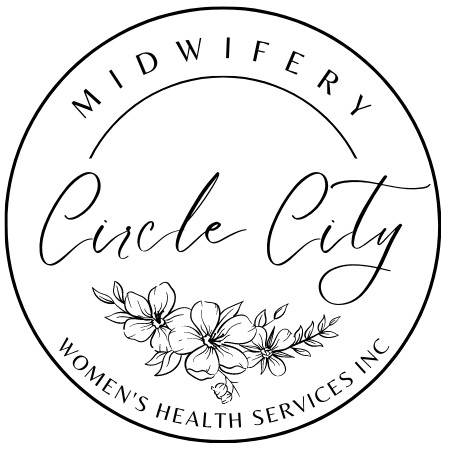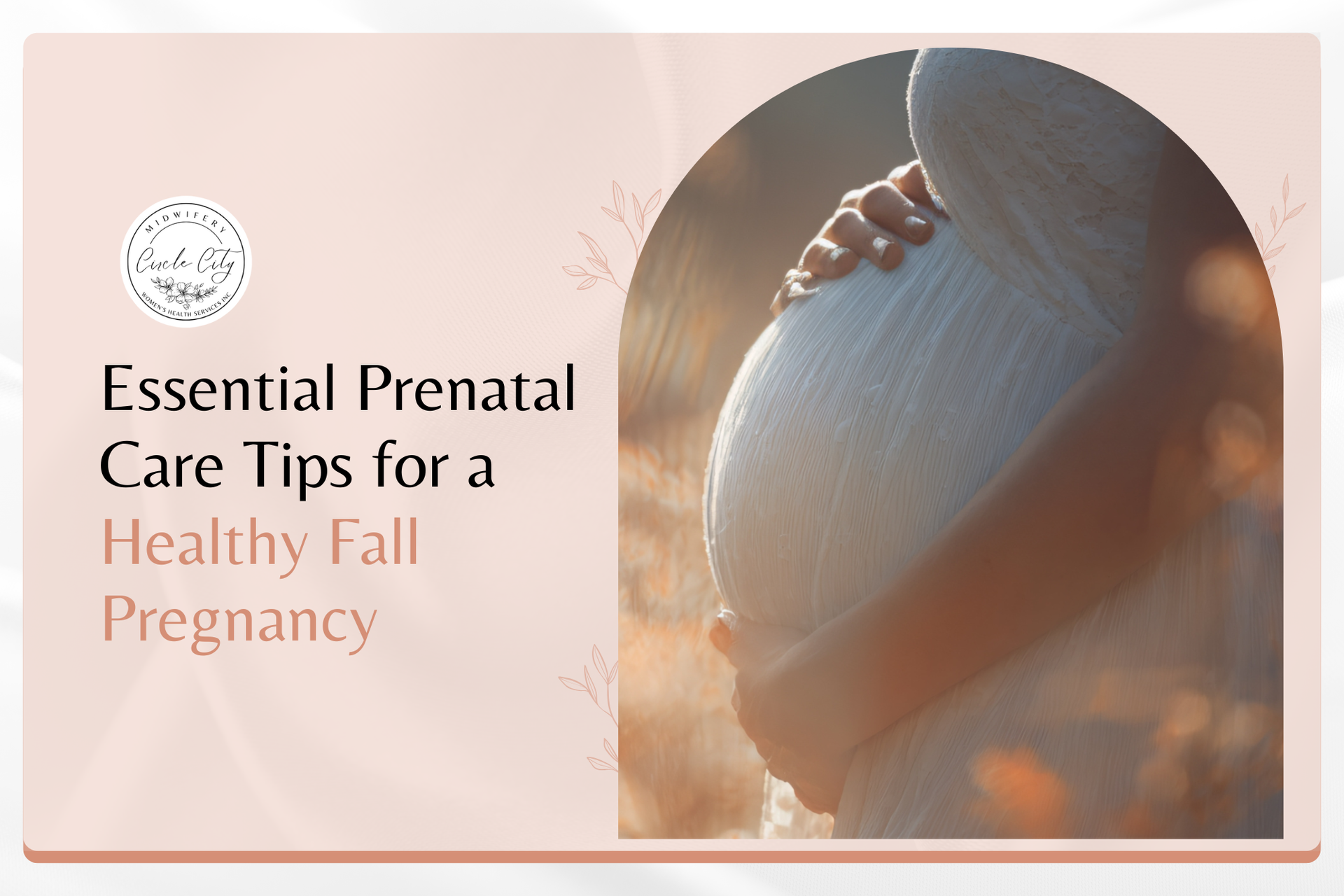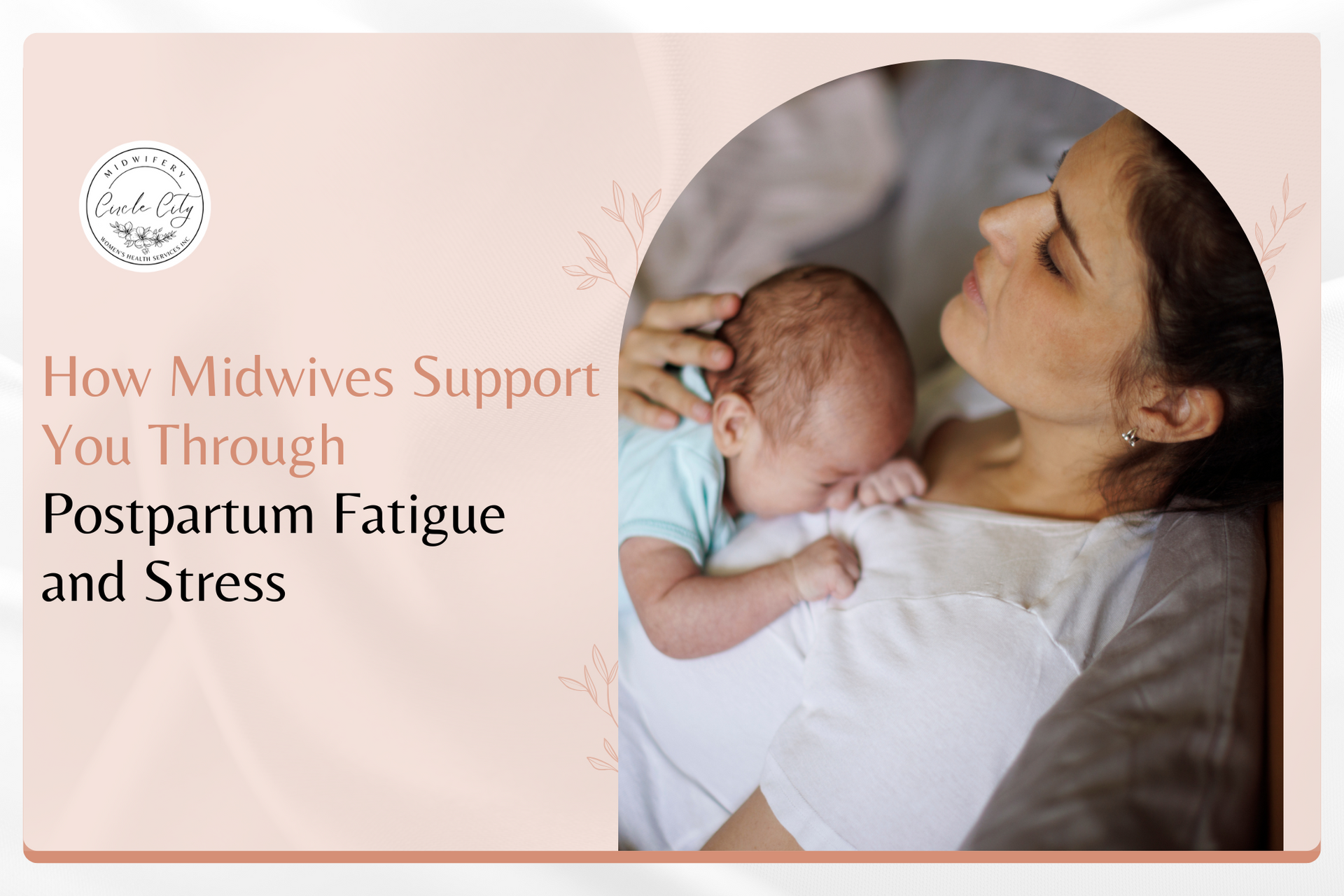Your baby's arrival marks the beginning of a new chapter filled with late-night feedings, endless diaper changes, and tender bonding moments. This time of transition also brings numerous changes to your body and emotions. Sleepless nights, physical discomfort, and emotional highs and lows can all take a toll on your well-being.
While these changes can be challenging, they are a natural part of the postpartum period. It's okay to feel overwhelmed, to have moments of doubt, and to seek support. Remember, you are not alone. Many new moms experience joy, fatigue, and everything in between.
Circle City Midwifery offers tips to help you through this period, promoting recovery and wellness for you and your baby.
Are you looking for support after giving birth?
What Happens to the Body Postpartum?
After childbirth, your body undergoes several changes as it starts the recovery process. Pain, discomfort, and other symptoms are expected during this period as your body heals and adjusts. However, if the pain and discomfort don't subside or they worsen, it's essential to consult your midwife or seek help from a
postpartum care center.
Here's a detailed look at what to expect and how to manage each change your body may undergo.
1. Bleeding (Lochia)
It's normal to experience vaginal bleeding, known as lochia. This bleeding lasts for several weeks and gradually changes in color from pink to bright red, brown, and finally white or yellow.
How to Manage: To reduce the risk of infection, use sanitary pads instead of tampons. Rest when you can, and do not lift heavy objects to help manage the flow.
2. Breast Changes
Your breasts may leak milk or become engorged or tender. You might also experience sore nipples, particularly in the early days of breastfeeding.
How to Manage: Wear a supportive bra, apply warm compresses before breastfeeding to help with milk flow, and use nipple creams to alleviate soreness.
3. Hormonal Fluctuations
Hormone levels change dramatically after childbirth, affecting mood, skin, and overall energy levels.
How to Manage: Maintain a balanced diet, stay hydrated, and get as much rest as possible. Gentle exercise also helps stabilize your mood and energy levels.
4. Uterine Contractions (Afterpains)
As your uterus contracts to its pre-pregnancy size, you might notice cramping that feels similar to menstrual cramps, which can be more pronounced during breastfeeding.
How to Manage: Practice relaxation techniques and use a heating pad to alleviate discomfort. If necessary, take over-the-counter pain relievers as your midwife or healthcare provider recommends.
5. Perineal Pain
If you had a vaginal delivery, especially with an episiotomy or tearing, you might experience significant pain and discomfort in the perineal area. The perineal area is located between the vaginal opening and the anus.
How to Manage: Use cold packs to reduce swelling and avoid too much movement that can cause friction. Strengthen your pelvic muscles with regular
. For added comfort, consider taking sitz baths to soothe any discomfort.
How Does Postpartum Affect Mental Health?
While your body heals, remember that your mind and emotions are also adjusting to motherhood. Recognizing and addressing these emotional changes can lead to a more holistic and quicker postpartum recovery.
1. Baby Blues
Many new mothers experience what is commonly known as the "baby blues." Symptoms usually begin within 2 to 35 days after delivery and can last up to two weeks.
Some of the signs of baby blues are:
- mood swings
- crying spells
- anxiety
- difficulty sleeping
How to Manage: Rest, nutritious meals, hydration, and support from family and friends can help manage the baby blues. Understanding that this emotional turbulence is common and temporary can also provide comfort.
2. Postpartum Depression
Nearly one in seven women is at
risk of developing postpartum depression. Postpartum depression (PPD) goes beyond the typical "baby blues." It's a serious clinical condition that affects new mothers typically within the first year after childbirth. Symptoms can include
- Persistent sadness
- Changes in appetite
- Severe mood swings
- Excessive crying
- Loss of interest in activities you once enjoyed
- Difficulty bonding with your baby
- Feelings of worthlessness
- Thoughts of harming yourself or your baby
How to Manage: Early intervention is critical. If you’ve been feeling the symptoms of postpartum depression for more than two weeks, seek help immediately. For postpartum mental health support, speak with your healthcare provider, who can assess and recommend appropriate treatment. This might include therapy, medication, or a combination of both. Connecting with support groups, whether online or in-person, can provide a comforting space where mothers can share experiences and find solace in knowing they are not alone in their challenges.
Read:
Postpartum Depression: Symptoms and Causes
3. Postpartum Anxiety
Postpartum anxiety is characterized by excessive worrying and irrational fears, often about the baby's health and safety. Symptoms can include
- Constant worry
- Feeling on edge
- Panic attacks
- Rapid heartbeat
- Difficulty sleeping
While postpartum anxiety is distinct, it can co-occur with postpartum depression.
How to Manage: Techniques such as mindfulness, deep breathing exercises, and cognitive-behavioral therapy (CBT) can help manage symptoms of anxiety. Medication may also be an option, but you should discuss it with a healthcare provider to find the safest approach, especially if you are breastfeeding.
4. Postpartum Psychosis
Though rare,
postpartum psychosis is a severe mental health condition that impacts around one to two in every 1,000 mothers. Symptoms usually appear within the first two weeks postpartum and can include:
- Delusions or strange beliefs
- Hallucinations (seeing or hearing things that aren’t there)
- Extreme agitation and anxiety
- Confusion and disorientation
- Rapid mood swings
- Attempts to harm yourself or the baby
How to Manage: If you or someone you know is showing signs of postpartum psychosis, it’s crucial to seek emergency medical assistance right away. Hospitalization is usually required to safeguard both mother and baby. Other treatments include a combination of antipsychotic medications, mood stabilizers, and psychotherapy.
More Postpartum Recovery Tips
Here are more valuable tips to support your recovery and well-being and help you thrive in your motherhood journey.
1. Practice Self-Compassion
Being kind to yourself during this period of adjustment is essential. Self-compassion helps mitigate negative self-talk and promotes a positive self-image. Treat yourself as you would a close friend. Allow yourself to make mistakes and learn from them. Celebrate small victories and remind yourself that it’s okay to ask for help.
2. Find Joy in Small Moments
Focus on small, positive moments to help balance the emotional challenges. Enjoying time with your baby, noticing their growth, and celebrating milestones can bring immense joy. Keep a journal of positive experiences and milestones. Share these moments with your partner or close friends. Practicing gratitude can also enhance emotional well-being.
3. Take a Pause
Your body needs time to heal after the physical exertion of childbirth. Rest is crucial for recovery, particularly in the first few weeks. Take naps when your baby sleeps, accept help from family and friends, and create a comfortable resting environment with supportive pillows and a cozy space.
4. Return to Activities Gradually
Exercise can boost your mood and aid in recovery, but it's essential to start slowly. While it’s important to remain active, jumping back into your pre-pregnancy routine too quickly can lead to complications or prolonged recovery. Start with gentle activities like short walks or light stretching. Listen to your body and slowly increase activity levels as you feel stronger. Avoid heavy lifting or intense exercise until you receive clearance from your healthcare provider.
5. Stay Hydrated and Eat Nutritious Foods
Adequate hydration and nutrition are vital for your recovery and energy levels. Your body needs extra nutrients to heal and to support breastfeeding if you choose to do so. Drink plenty of water throughout the day and focus on a balanced diet rich in fruits, lean proteins, vegetables, and whole grains.
6. Seek Professional Help When Needed
Sometimes, the challenges of postpartum recovery can be overwhelming, and professional help is necessary. Certified nurse midwives and other healthcare providers can support new mothers through this critical period.
If you experience persistent physical pain, emotional distress, or difficulties with breastfeeding, don't hesitate to reach out to a postpartum care facility. These centers offer various services, including physical therapy, mental health support, and lactation consulting.
Compassionate Postpartum Care at Circle City Midwifery
At Circle City Midwifery, we recognize the unique challenges of the postpartum period. Our dedicated
team of certified nurse midwives is here to provide unwavering support to new mothers throughout their recovery journey.
We provide comprehensive, personalized care plans that address physical healing, emotional well-being, and infant care. Whether you need help with breastfeeding, managing postpartum symptoms, or simply want a listening ear, we are here to help you thrive as a new mom.
For more information or to schedule a consultation, please call 951-547-4208 or
complete our online form.















